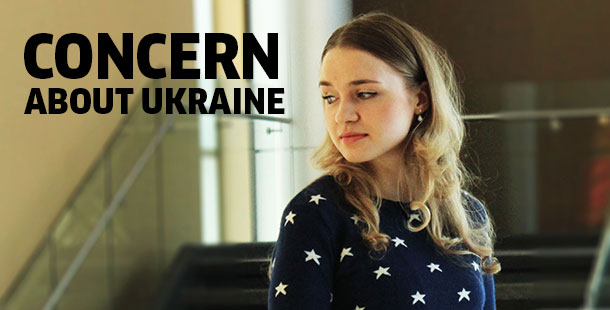Iryna Petruniak has been having trouble sleeping lately. While, for other students, a lack of sleep may come from school-related stress, work responsibilities or household tasks, Petruniak’s worries come from a place that’s more than 5,000 miles away.
Petruniak is from the Carpathian Mountains in Western Ukraine. Political protests have been going on in Kiev, the country’s capital, since November. Her fellow Westerners have been disputing former president Viktor Yanukovych’s decision to shut down a European Union trade deal and, instead, turn toward Russia for financial support. While Eastern Ukrainians flocked to Kiev to support Yanukovych’s decision, Petruniak’s neighbors and some distant relatives did the same to fight for their independence.
Petruniak, a Madison College accounting student, came to the United States almost four years ago. As civil unrest ensues back home, she worries for the safety of loved ones and the future of her country. When Petruniak is able to sleep, she wakes up and immediately checks the news each morning to seek out whatever news she can from back home. She also communicates with her parents through Skype to get information.
“When it get’s really bad we Skype every day,” she said.
Petruniak said Western Ukrainians, like herself, are very patriotic people.
“We speak Ukrainian. Eastern Ukrainians speak Russian. People in Western Ukraine will especially tell you that we don’t really trust or want to go with Russia,” she said.
This mistrust comes from a history of maltreatment from Russia, which dates back to World War I.
“In the past they’ve tried to invade and destroy us,” she said. “We have pretty much been slandered and robbed by them.”
As the Winter Olympics took place in Sochi, Russia during some of the most eventful days of the protest, Petruniak worried that Russian President, Vladimir Putin, was holding back until the global eyes were off of his country.
During the Olympics, Petruniak said inside of Ukraine everyone said Russia doesn’t want to do anything bad right now because of the Olympics and didn’t want to look bad for the world. Like many Ukranians, she said she is fearful of the events that could play out in the near future.
“They say when it ends we’re going to get it,” Petruniak said.
Petruniak’s suspicions were somewhat justified when Russian soldiers showed up in Crimea just four days after the closing ceremony. The armed soldiers seized public buildings as Russian parliament approved Putin’s request to use military power in Ukraine.
Petruniak said she appreciates the sacrifices Ukranian athletes made when giving up their Olympic opportunity to stand up for their country.
“You probably get that chance once in a lifetime,” she said. “I was really impressed by that. I was very proud of them.”
Petruniak said she wishes she could be back home during this time when her people have more control over their future than ever before. She also hopes the new government is free of corruption and dictatorship, and the elected officials love Ukraine as much as the people do.
While disagreements between the East and West are far from extinguished, Petruniak said she feels that the recent progress is a win for her people.
“It means people didn’t die for nothing, and that together we are powerful and strong, and now we have hope for a better future,” Petruniak said.
Fear of association with Russia is what drove Western Ukrainians to the country’s largest city in November. According to BBC reports, the protest took its most violent turn on Feb. 18 when a Ukrainian Parliament speaker rejected a debate on changing the constitution. On Feb. 21, Ukrainian officials and foreign diplomats underwent intense negotiations that led to the reduction of Yanukovych’s powers and the withdrawal of security forces from protest areas. Following this decision, a warrant was put out for the former president’s arrest and he fled to Russia.
New elections have been set for May 2014 for the top positions of government. Until then, parliament has named Olexander Turchynov as the interim president. Turchynov is an ally of the recently freed former Prime Minister Yulia Tymoshenko. Both leaders are in opposition to Yanukovych and his decisions.
With such reform in place, Petruniak and other members of the opposition are rejoicing but she worries that people outside of Ukraine will get the wrong idea of her native people.
“Ukrainians have always been known around the world as very kind and humble people,” Petruniak said. “As much as everybody wants to revolt and put Yanykovych in jail, I hope that people are not going to forget who we are.”




























